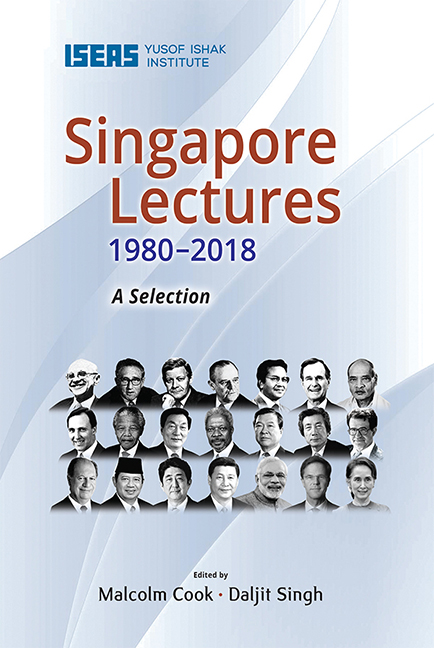Book contents
- Frontmatter
- Contents
- Introduction
- 1 The Invisible Hand in Economics and Politics
- 2 American Foreign Policy: A Global View
- 3 The Soviet Union: Challenges and Responses as Seen from the European Point of View
- 4 Trends in the International Financial System
- 5 Regionalism, Globalism and Spheres of Influence: ASEAN and the Challenge of Change into the 21st Century
- 6 US Policy in the Asia-Pacific Region: Meeting the Challenges of the Post-Cold War Era
- 7 India and the Asia-Pacific: Forging a New Relationship
- 8 Australia, Asia and the New Regionalism
- 9 South and Southern Africa into the Next Century
- 10 China and Asia in the New Century
- 11 Global Values: The United Nations and the Rule of Law in the 21st Century
- 12 Peace on the Korean Peninsula and East Asia
- 13 Japan and ASEAN in East Asia: A Sincere and Open Partnership
- 14 EU and Asia: Sharing Diversity in an Inter-regional Partnership
- 15 Global Challenges in the 21st Century: A View from Chile
- 16 Indonesia: The Challenge of Change
- 17 Japan and ASEAN, Always in Tandem: Towards a More Advantageous Win-Win Relationship through My “Three Arrows”
- 18 Forging a Strong Partnership to Enhance Prosperity of Asia
- 19 India’s Singapore Story
- 20 The Netherlands, Singapore, Our Regions, Our World: Connecting Our Common Future
- 21 Democratic Transition in Myanmar: Challenges and the Way Forward
- The Singapore Lecture Series
- The Editors
18 - Forging a Strong Partnership to Enhance Prosperity of Asia
Published online by Cambridge University Press: 09 October 2021
- Frontmatter
- Contents
- Introduction
- 1 The Invisible Hand in Economics and Politics
- 2 American Foreign Policy: A Global View
- 3 The Soviet Union: Challenges and Responses as Seen from the European Point of View
- 4 Trends in the International Financial System
- 5 Regionalism, Globalism and Spheres of Influence: ASEAN and the Challenge of Change into the 21st Century
- 6 US Policy in the Asia-Pacific Region: Meeting the Challenges of the Post-Cold War Era
- 7 India and the Asia-Pacific: Forging a New Relationship
- 8 Australia, Asia and the New Regionalism
- 9 South and Southern Africa into the Next Century
- 10 China and Asia in the New Century
- 11 Global Values: The United Nations and the Rule of Law in the 21st Century
- 12 Peace on the Korean Peninsula and East Asia
- 13 Japan and ASEAN in East Asia: A Sincere and Open Partnership
- 14 EU and Asia: Sharing Diversity in an Inter-regional Partnership
- 15 Global Challenges in the 21st Century: A View from Chile
- 16 Indonesia: The Challenge of Change
- 17 Japan and ASEAN, Always in Tandem: Towards a More Advantageous Win-Win Relationship through My “Three Arrows”
- 18 Forging a Strong Partnership to Enhance Prosperity of Asia
- 19 India’s Singapore Story
- 20 The Netherlands, Singapore, Our Regions, Our World: Connecting Our Common Future
- 21 Democratic Transition in Myanmar: Challenges and the Way Forward
- The Singapore Lecture Series
- The Editors
Summary
President Xi Jinping of the People's Republic of China delivered the 36th Singapore Lecture on 7 November 2015, during his first state visit to Singapore. The occasion also marked the 25th anniversary of the establishment of diplomatic relations between Singapore and China. President Xi was introduced by Singapore's Deputy Prime Minister and Coordinating Minister for National Security Mr Teo Chee Hean. President Xi spoke as the confident leader of a country whose astonishing development had catapulted it to the second largest economy in the world and with greatly expanded influence.
Prime Minister Lee Hsien Loong,
Deputy Prime Minister Teo Chee Hean,
NUS President Mr Tan Chorh Chuan,
Professor Wang Gungwu,
Faculty Members and Students,
Ladies and Gentlemen,
Good morning! I am delighted to come to the National University of Singapore and talk to you as a guest speaker of Singapore Lecture. This year marks the 25th anniversary of the establishment of diplomatic relations between China and Singapore, and it gives me great pleasure to pay a state visit to the garden state of Singapore at the invitation of President Tan Keng Yam.
With a history of 110 years, the National University of Singapore is renowned both in Asia and internationally. Many Singaporean leaders such as Mr Lee Kuan Yew, President Tan Keng Yam, Mr S.R. Nathan and Mr Goh Chok Tong, graduated from NUS. Indeed, NUS has produced a galaxy of talents and outstanding public leaders for Singapore. NUS champions the vision that there should be no walls around minds, no walls to ideas, no walls to talent and no walls between discovery. Such a no-walls culture embodies the creative, enterprising, open and inclusive spirit of Singapore, an important factor contributing to the success of NUS and Singapore.
This year marks the 50th anniversary of the independence of Singapore. In the last 50 years, the hard-working and visionary people of Singapore have endured hardships and succeeded in building Singapore into one of the most advanced countries in Asia and a leading international economic, financial, shipping, and refining and petrochemicals center. Its achievements in national development are widely recognized.
- Type
- Chapter
- Information
- Singapore Lectures 1980-2018 , pp. 259 - 272Publisher: ISEAS–Yusof Ishak InstitutePrint publication year: 2020

